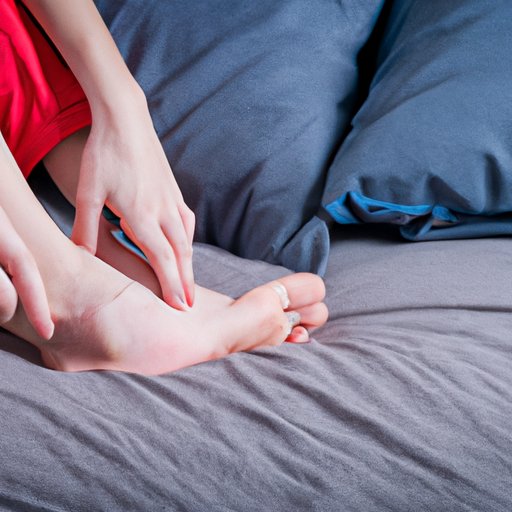
Introduction
Do you ever have trouble falling asleep or wake up in the middle of the night with a tingling sensation in your feet? Tingling feet at night, also known as peripheral neuropathy, is a common issue that affects millions of people. Not only is it uncomfortable, but it can also disrupt your sleep and lead to chronic pain if left untreated. In this article, we will explore some of the common causes of tingling feet and provide home remedies, mindfulness techniques, and prevention tips to help mitigate this issue.
Causes of Tingling Feet at Night
Peripheral neuropathy is a condition where there is damage or dysfunction to the nerves outside of the brain and spinal cord. This can result in a tingling sensation, numbness, or burning feeling in the feet. Some of the common causes of peripheral neuropathy include:
Neuropathy and Its Causes
One of the most common causes of neuropathy is diabetes. High blood sugar levels can damage the nerves in the feet and lead to a tingling sensation. Other health conditions like HIV, hepatitis C, alcoholism, and autoimmune diseases can also cause neuropathy.
Cold Feet and How It Triggers Tingling Sensation
Another common cause of tingling feet is exposure to cold temperatures. When your feet are cold, blood flow is decreased, and the nerves do not get enough oxygen and nutrients. This can result in a tingling or numb sensation.
Vitamin B Deficiencies and How It Affects the Body
Vitamin B deficiency, especially vitamin B12, can also cause neuropathy. This vitamin plays an essential role in nerve health and the production of red blood cells. Without enough vitamin B12, nerve function can be impaired and lead to tingling feet.
Home Remedies for Tingling Feet at Night
Here are some home remedies you can try to alleviate the symptoms of tingling feet:
Exercise to Improve Circulation
Regular exercise, even light-intensity workouts like walking, can help improve circulation and ease the tingling sensation. Try to incorporate some stretching exercises or simple yoga poses before bed to promote blood flow and nerve health.
Massaging the Feet to Relieve Tension and Stress
Another effective way to relieve the symptoms of tingling feet is to massage them. Gently rub your feet with your hands or a tennis ball to loosen tight muscles and reduce stress. Adding a few drops of peppermint or eucalyptus oil can also provide a cooling, soothing effect.
Keep Feet Warm with Socks or Heating Pads
As mentioned earlier, cold feet can trigger tingling sensations. Keeping your feet warm with socks or heating pads can improve blood flow and ease the symptoms. Just be careful not to overheat your feet, as this can also cause issues.
When to See a Doctor for Tingling Feet
While most cases of tingling feet at night are harmless and can be treated with home remedies, some symptoms require medical attention. If you experience any of the following, it’s crucial to talk to your doctor:
- Persistent tingling or numbness that worsens over time
- Weakness in the feet or legs
- Bowel or bladder dysfunction
- Injury or trauma to the feet
- Skin changes or ulcers on the feet
Your doctor may perform various tests and investigations to determine the underlying cause of your symptoms. These may include a physical exam, nerve conduction studies, blood tests, or MRI scans.
How to Choose the Right Footwear for Prevention
Choosing the right footwear can also play a role in preventing tingling feet. Here are some things to consider when shopping for shoes:
Proper Fitting Shoes That Are Comfortable
Make sure your shoes fit correctly and do not pinch or rub any areas of your feet. Look for shoes with a wider toe box to allow for more room to move your toes. Avoid shoes that are too tight or too loose and opt for comfortable, cushioned options.
Avoiding High Heels and Pointed Shoes
High heels and pointed shoes can put pressure on certain areas of your feet and lead to nerve damage over time. If you wear heels, try to limit the height and duration and opt for more comfortable options like flats or sneakers instead.
Choosing Shoe Inserts for Additional Support
Shoe inserts, also known as orthotics, can provide extra support and cushioning to your feet. They can help distribute your weight more evenly and reduce pressure on certain areas of your feet. Consider investing in a pair of high-quality inserts to wear in your shoes.
Mindfulness Techniques to Calm the Body & Reduce Tingling
Practicing mindfulness techniques can also help reduce the symptoms of tingling feet. Here are a few techniques to consider:
Deep Breathing Exercises
Taking slow, deep breaths can help reduce stress and promote relaxation. Try inhaling for four counts, holding for seven, and exhaling for eight counts to calm your mind and reduce tension.
Meditation and Visualization
Meditation and visualization techniques can help calm your mind and reduce stress. Find a quiet, comfortable place to sit and visualize a relaxing scene or listen to a guided meditation online.
Yoga Postures and Its Benefits
Yoga is a great way to reduce stress, increase circulation, and promote relaxation. Try practicing a few simple yoga poses before bed, such as downward dog or child’s pose, to ease tension and promote restful sleep.
Conclusion
Tingling feet at night is a common issue that can disrupt your sleep and lead to chronic pain if left untreated. Understanding the common causes and home remedies can help alleviate the symptoms and promote overall foot health. Remember to seek medical attention if you experience persistent symptoms or weakness in the feet or legs. By incorporating mindfulness techniques, choosing the right footwear, and taking care of your feet, you can reduce the symptoms of tingling feet and promote a healthier, happier you.




